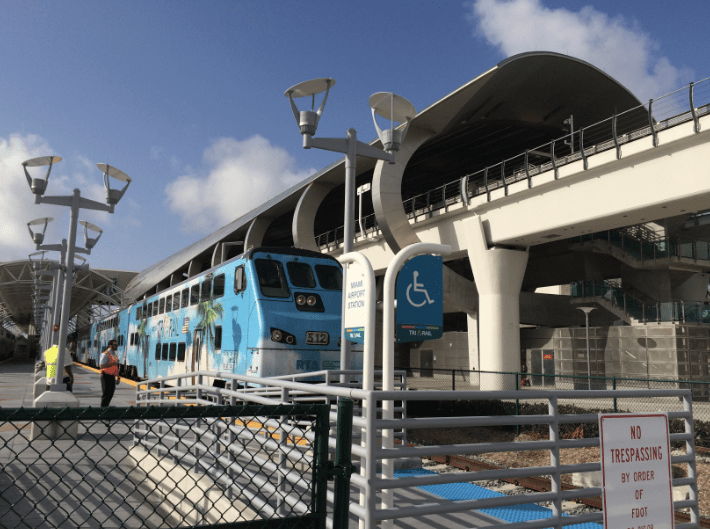Each weekday, the Miami-Fort Lauderdale commuter rail service, Tri-Rail, carries about 15,000 passengers -- students, commuters making connections to Miami's Metrorail, workers heading to the airport. In 2018, Tri-Rail plans to expand with a new station in downtown Miami, thanks to a clever partnership that takes advantage of rail infrastructure built by the private intercity outfit All Aboard Florida.
But out of the blue Tri-Rail is facing insolvency -- all because a single state bureaucrat is threatening to throw the agency's otherwise stable finances into turmoil.
Tri-Rail, by law, receives $30 million in annual support from the Florida Department of Transportation. But last week the state inspector general who monitors Florida DOT, Bob Clift, recommended a big change in the way Tri-Rail is funded, the Miami Herald reports. Instead of FDOT providing funds upfront on a quarterly basis, Clift wants Tri-Rail to apply for reimbursement from FDOT after six months.
The Herald reports that Clift, who was appointed to an inspector general post back in 1997, was influenced by an unnamed former FDOT District 4 secretary "who became concerned about the transparency of Tri-Rail's spending." Clift's report says Tri-Rail provided a "FY 2013/14 operating budget that noted the planned use of funds by source, but the information lacked comparison to final budgetary amounts and actual expenditures."
While there may be a legitimate need for better disclosure and transparency at Tri-Rail, Clift's recommendation to withhold funds is too extreme, says Andrew Frey, a board member for the South Florida Regional Transportation Authority, which runs the service.
"We’d go dark," Frey told Streetsblog. "We would cease to exist."
The problem, Frey said, is that the agency doesn't have $30 million lying around to support its operations for six months. The new funding arrangement could literally force the agency to shut down. If Clift's recommendation is accepted by FDOT, Tri-Rail would have to suspend service in July.
The news of Clift's decision just came to light on Friday, at SFRTA's most recent board meeting, said Frey.
Frey, who was appointed by Governor Rick Scott, disputed the legal basis for changing current practice. "They’re basically going against the plain English of the law, which says notwithstanding any other provision of state law, SFRTA gets $30 million from FDOT," he said.
The SFRTA board has declined to take the case to a judge, Frey said. Instead the agency will appeal to current FDOT District 4 Secretary Gerry O’Reilly, who also sits on the SFRTA board. O'Reilly told the Herald he would work on a mutually acceptable solution to the situation.






